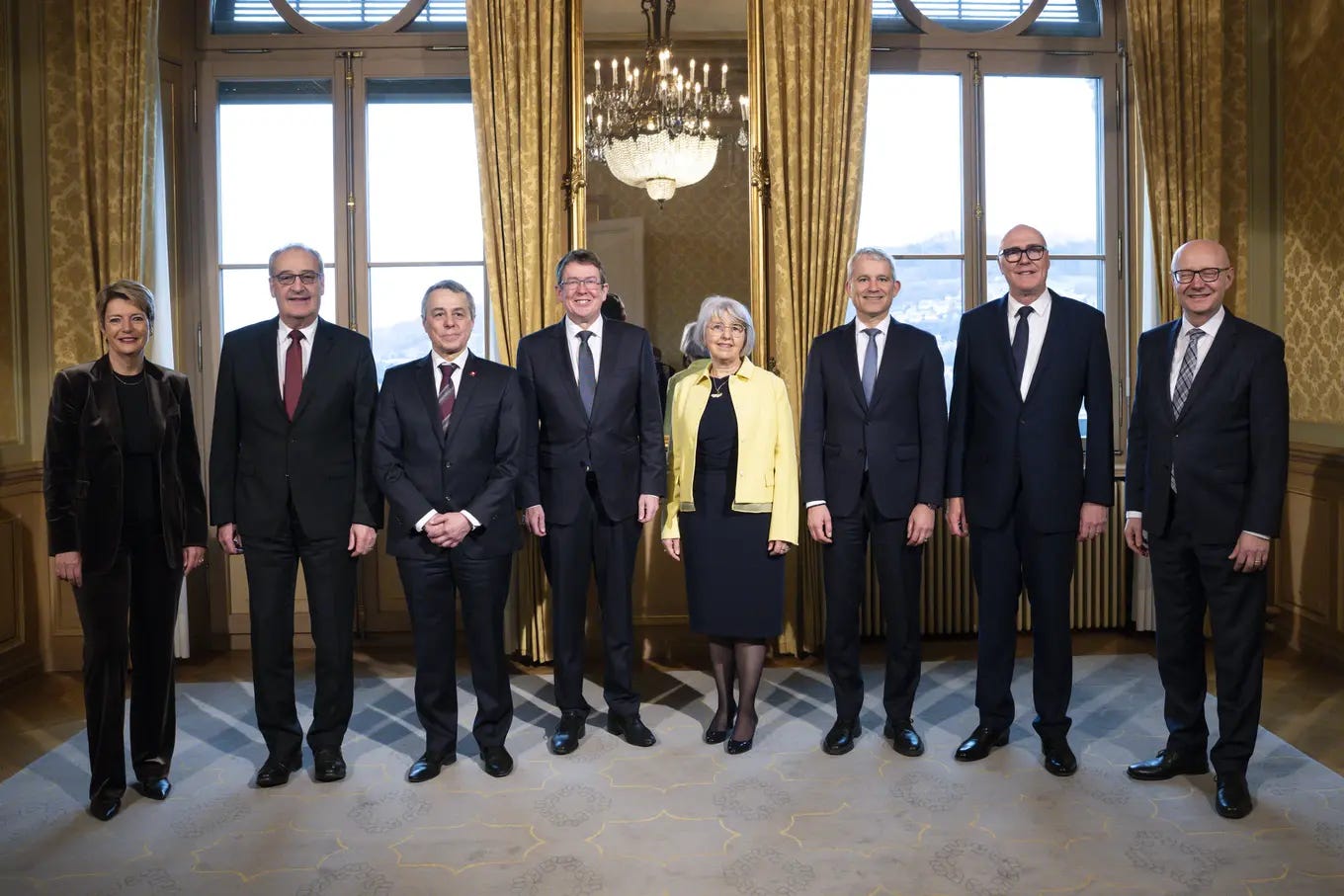Dear Insider,
Ostensibly, it was a routine occurrence:
One Swiss federal councillor steps down, another takes his or her place.
This election, however, was anything but normal.
In a surprise vote, the combined houses of the Swiss parliament elected Martin Pfister to replace outgoing Defence Minister Viola Amherd.
Here’s what it means - and could mean - for Switzerland.
Enjoy,
Ian
The (personal) details
The final showdown between Markus Ritter, the hard-nosed Farmers’ Association president and the soft-spoken Marin Pfister didn’t take long.
Pfister secured his post already in the second round of voting by the combined houses of parliament when he received 134 out of 245 valid votes while Ritter garnered 110 votes.
Upon being sworn in before the combined chambers of the Swiss parliament, Pfister pronounced a simple reaction: “My place is in the Federal Council now.”
Born on July 31, 1963, in Zug, Pfister is a historian and seasoned politician.
He began his political journey in the Cantonal Council of Zug in 2006 and served until 2016.
Since then, he has been a member of the Executive Council of Zug, overseeing the health department. His tenure as health director was marked by his leadership during the COVID-19 pandemic, where he played a pivotal role in crisis management.
He also holds the rank of Colonel in the Swiss Army.
The backstory and implications
In the end, voting blocks among the major parties in parliament fell more or less as expected.
While right right-wing SVP, with its strong base among farmers, voted almost to a man/woman for Ritter.
On the other side of the spectrum, SP and the Greens backed Pfister, with his more ethnically diverse background (Pfisters’s wife comes from Portugal) and his quieter, less domineering manner.
Those closest to him have described Pfister as a "quiet doer” - a quality that fits well into the model for Federal Councillors who must often candidate for the country’s highest position without seeming to want it too much.
A question of balance
The Centre’s two-man ticket received sharp criticism from some circles - also on the left - for not having included a woman.
SP Co-President Mattea Meyer in particular expressed her concern that the Federal Council did adequately represent the diversity of Swiss society.
With Pfister’s election, the Federal Council is now comprised of 5 men and 2 women. On the other hand, the election of a German-speaking councillor maintains the language balance.
More importantly, Pfister becomes the first representative of the central Switzerland region in the Federal Council in over 20 years.
Ready for war?
The bigger question - and more important for the future of Switzerland - is how Martin Pfister will perform.
SVP President Marcel Detting, who’s party did not generally support Pfister declared starkly that he would “wait and see” how the new man measures up.
As expected, Pfister will step into the shoes of Viola Amherd in the Department of Defence and Sport - where his unenviable task will be to “clean up the mess” and make the Swiss Armed Forces fit for purpose.
He faces a daunting challenge - one which many do not know if he can handle, given his laid-back demeaner and low-key profile.
Immediately after his election, FDP put out a post on X calling for Pfister to jump in with both feet and restore trust - and competency - in the services.
Indeed - the situation is drastic and the threat of war in Europe greater than at any time in recent memory.
With that in mind, Detting called for Pfister to “stand guard” and protect Switzerland’s neutrality - while avoiding any military or political entanglements abroad.

The aftermath
What will Pfister’s election mean for Switzerland long-term?
The devil is - as always - in the details. And will only become clear over time.
There are a few possibilities:
Business (as usual) - The choice of a representative of “globalist”, business-friendly Zug brings a decidedly corporate angle into the Federal Council.
In a world full of tariffs and geopolitical strife, keeping Switzerland “open for business” will be key. But the Defence Department may not be the place to employ these attributes…just yet.
Left or not? - The “coalition” that secured Pfister’s place in the Federal Council had a decidedly leftish weight - with SP and the Greens making the difference. Will they be disappointed in him?
Mattea Meyer’s scepticism nonetheless, there is a growing feeling that the Centre party may tend towards the left side of the political spectrum, leaving FDP and SVP in a tough position.
It’s all about the money - Despite taking up Amherd’s post in the VBS, with great pressure to whip the armed forces into shape, the real challenge that Pfister faces is about budgets.
As with other European countries - and the US as well - financing an army with expensive equipment is a financial balancing act. Experience in the no-less challenging health system as Zug’s minister for health may help Pfister in this regard.
But the scale of his work is now much bigger…





